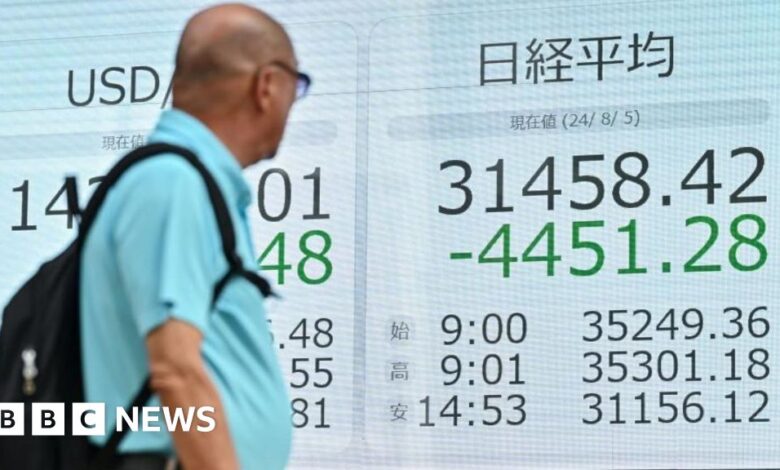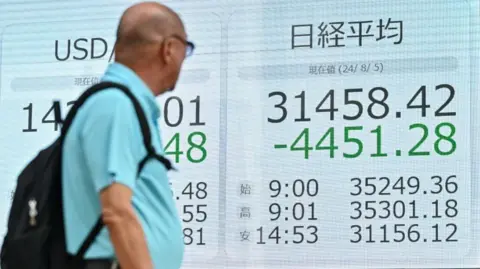UK and European stock markets fall on US concerns

 beautiful pictures
beautiful picturesEuropean stock markets fell on Monday after Asian stocks fell sharply on concerns the US economy is heading for recession.
In London, the FTSE 100 fell 2.1% while in Paris, the CAC-40 fell 2.2% and Frankfurt’s DAX fell 2.4%.
Earlier, Asian markets plunged, with Japan’s Nikkei 225 index falling 12.4% or 4,451 points, its biggest point drop on record.
The news comes as weak US jobs data released on Friday raised concerns about the world’s largest economy.
Meanwhile, the yen has strengthened against the US dollar since the Bank of Japan raised interest rates last week, making Tokyo stocks more expensive for foreign investors.
Stock markets in Taiwan, South Korea, India, Australia, Hong Kong and Shanghai all fell.
Weaker-than-expected economic data from the United States has fueled speculation that the country’s economy is slowing.
Meanwhile, the US Federal Reserve postponed an interest rate cut last week, in contrast to other central banks such as the Bank of England.
While the Bank of England’s first interest rate cut in more than four years is seen as a sign that the UK economy is turning around, any concerns about the US economy could spook markets everywhere.
There are also concerns that stocks of technology companies, such as those focused on artificial intelligence (AI), have become overvalued and are now struggling.
Intel announced major layoffs last week. as well as disappointing financial results, and speculation that rival Nvidia, the maker of AI chips, will delay its latest launch.
The US Nasdaq index, which includes a large number of technology companies, hit a record high last month but last week fell about 10% in what is known as a “correction”.
Meanwhile, veteran American investor Warren Buffett’s Berkshire Hathaway revealed that it has sold about half of its shares in American technology giant Apple.
The Dow Jones Industrial Average also fell 1.5% on Friday and the S&P 500 fell 1.8%.
‘Too much’
Tomochika Kitaoka, chief equity strategist at Nomura Securities, said fears of a US recession were “overwhelming”.
“But [Japanese] The market became nervous after the Bank of Japan raised interest rates because they said the domestic economy was not strong enough to justify a rate hike.”
Unlike other central banks, the Bank of Japan raised interest rates last week to their highest level since the 2008 global financial crisis.
Inflation in Japan rose more than expected in June while the economy contracted in the first three months of the year due to a weak yen and poor household spending.
The Japanese currency has appreciated more than 10% against the US dollar over the past month.
A stronger yen makes Japanese goods more expensive and therefore less attractive to potential buyers abroad.
Elsewhere in the Asia-Pacific region, stock markets fell between 1.4% and 8%.
Cryptocurrencies also fell. Bitcoin fell to around $50,000, its lowest level since February.
Unemployment
US stocks fell sharply on Friday following weak jobs data.
In July, US employers added 114,000 jobs, far fewer than expected, while the unemployment rate rose to 4.3% from 4.1%.
The numbers raise concerns that the long-running U.S. jobs boom may be coming to an end.
This has fueled speculation about the timing and extent of interest rate cuts by the Federal Reserve.
Simon French, chief economist and head of research at Panmure Liberum, said it was unclear whether the jobs figures were an anomaly because Hurricane Beryl in July or the first sign that companies are hiring fewer workers.
The latest data shows the US economy growing at an annual rate of 2.8%.
On whether the US is heading for a recession, Shanti Kelemen, investment director at M&G Wealth, told the BBC’s Today programme that it could go either way.
“You can pick and choose evidence to create a positive story, you can pick and choose evidence to create a negative story,” she said.
“I don’t think it points in any general direction.”



